This story is taken from the KPMG-Irish Farmers Journal AgriBusiness Report on sale with this week's print edition
As we are now firmly competing on a global stage, exporting 90% of the food we produce, this year’s Irish Farmers Journal/KPMG survey broadens its horizons and takes on a global view. With thanks to the help of KPMG’s global agribusiness network, the survey takes in the views of 83 companies from 16 countries around the world.
Our survey includes views from a broad range of agribusinesses including some of the largest agribusiness companies in major exporting countries, who may compete with Irish agribusinesses. The survey also includes companies operating in net importing countries and companies in a number of sectors including dairy, meat, grain, sugar, ethanol and horticulture.
Our survey collates the views of key decision-makers in the agribusiness sector across a wide range of topics including economic outlook, investment plans, acquisition activity and key challenges, both internal and external.
The questions posed were designed to highlight emerging trends. We also sought to provide an insight into the importance of research and development activity, product innovation and sustainability initiatives to companies in the sector.
Our survey was based on a questionnaire prepared by KPMG and the Irish Farmers Journal and completed by participants in early 2016. The results are encouraging and continue to demonstrate a confidence in the sector. However, challenges exist in relation to the need to innovate, access to finance, and the recruitment and retention of key personnel. Companies need to reflect on how to address these challenges.
Methodology
The research for the survey was conducted by a combined team from the Irish Farmers Journal and KPMG and was based on a representative sample of agribusiness from around the world.
The survey, which consisted of a broad range of questions on agribusiness related topics, was completed by senior management of 83 agribusinesses around the world. The survey was broken into nine sections. The first two sections focused on projected business growth and planned investment.
The following sections dealt with innovation and sustainability. Competiveness was a key focus of the survey where we asked questions around labour, market access, government support and infrastructure. Finally, we asked businesses their views on the future outlook for the sector.
We would like to thank all the respondents for taking the time to complete the Agribusiness survey, and we hope you find our results informative and insightful.

With 91% of companies surveyed seeking to grow their business in 2016, the key growth driver identified by most companies was expansion into new markets. An increase in consumer demand around the world was also identified as an important driver of growth in 2016.
Innovation also features high on the agenda, but interestingly expansion within existing markets ranks higher in priority than growth in emerging markets. This is perhaps reflective of the challenges many emerging economies have faced in the last 12 months.
While sustainability was identified as important, businesses surveyed do not see it as a prerequisite to growth in 2016. Interestingly the Russian companies we surveyed expect the continuation of the trade embargo on Western food products to facilitate business growth in 2016.

Across the world there was a divergence of views of how supportive respective governments were. Almost a third said the government in their country was unhelpful where they wanted reduced bureaucracy, tax structures to support innovation and even application of regulations across regions. Irish companies wanted speedier negotiations and implementation of free trade agreements at EU level.

As we can see, many of the challenges faced by agribusinesses were common across countries. By far the largest challenge was volatility, followed closely by access to funding. Unsurprisingly, the second largest external challenge to businesses surveyed was overcoming the difficult economic conditions that persist in the world today. Innovation was seen as a key internal challenge for businesses along with employee retention.

Looking ahead – one of the key trends emerging in the global agribusiness sector is the backward integration towards the primary producer. This can be seen where companies are keen to remove links from the supply chain to gain efficiencies.
Companies are also very interested in selling direct to the consumer, with e-commerce facilitating this trend. The emerging markets of China, the Middle East and Africa remain the regions with the greatest growth opportunities.
Read more
To read the full Agribusiness report, click here.
This story is taken from the KPMG-Irish Farmers Journal AgriBusiness Report on sale with this week's print edition
As we are now firmly competing on a global stage, exporting 90% of the food we produce, this year’s Irish Farmers Journal/KPMG survey broadens its horizons and takes on a global view. With thanks to the help of KPMG’s global agribusiness network, the survey takes in the views of 83 companies from 16 countries around the world.
Our survey includes views from a broad range of agribusinesses including some of the largest agribusiness companies in major exporting countries, who may compete with Irish agribusinesses. The survey also includes companies operating in net importing countries and companies in a number of sectors including dairy, meat, grain, sugar, ethanol and horticulture.
Our survey collates the views of key decision-makers in the agribusiness sector across a wide range of topics including economic outlook, investment plans, acquisition activity and key challenges, both internal and external.
The questions posed were designed to highlight emerging trends. We also sought to provide an insight into the importance of research and development activity, product innovation and sustainability initiatives to companies in the sector.
Our survey was based on a questionnaire prepared by KPMG and the Irish Farmers Journal and completed by participants in early 2016. The results are encouraging and continue to demonstrate a confidence in the sector. However, challenges exist in relation to the need to innovate, access to finance, and the recruitment and retention of key personnel. Companies need to reflect on how to address these challenges.
Methodology
The research for the survey was conducted by a combined team from the Irish Farmers Journal and KPMG and was based on a representative sample of agribusiness from around the world.
The survey, which consisted of a broad range of questions on agribusiness related topics, was completed by senior management of 83 agribusinesses around the world. The survey was broken into nine sections. The first two sections focused on projected business growth and planned investment.
The following sections dealt with innovation and sustainability. Competiveness was a key focus of the survey where we asked questions around labour, market access, government support and infrastructure. Finally, we asked businesses their views on the future outlook for the sector.
We would like to thank all the respondents for taking the time to complete the Agribusiness survey, and we hope you find our results informative and insightful.

With 91% of companies surveyed seeking to grow their business in 2016, the key growth driver identified by most companies was expansion into new markets. An increase in consumer demand around the world was also identified as an important driver of growth in 2016.
Innovation also features high on the agenda, but interestingly expansion within existing markets ranks higher in priority than growth in emerging markets. This is perhaps reflective of the challenges many emerging economies have faced in the last 12 months.
While sustainability was identified as important, businesses surveyed do not see it as a prerequisite to growth in 2016. Interestingly the Russian companies we surveyed expect the continuation of the trade embargo on Western food products to facilitate business growth in 2016.

Across the world there was a divergence of views of how supportive respective governments were. Almost a third said the government in their country was unhelpful where they wanted reduced bureaucracy, tax structures to support innovation and even application of regulations across regions. Irish companies wanted speedier negotiations and implementation of free trade agreements at EU level.

As we can see, many of the challenges faced by agribusinesses were common across countries. By far the largest challenge was volatility, followed closely by access to funding. Unsurprisingly, the second largest external challenge to businesses surveyed was overcoming the difficult economic conditions that persist in the world today. Innovation was seen as a key internal challenge for businesses along with employee retention.

Looking ahead – one of the key trends emerging in the global agribusiness sector is the backward integration towards the primary producer. This can be seen where companies are keen to remove links from the supply chain to gain efficiencies.
Companies are also very interested in selling direct to the consumer, with e-commerce facilitating this trend. The emerging markets of China, the Middle East and Africa remain the regions with the greatest growth opportunities.
Read more
To read the full Agribusiness report, click here.








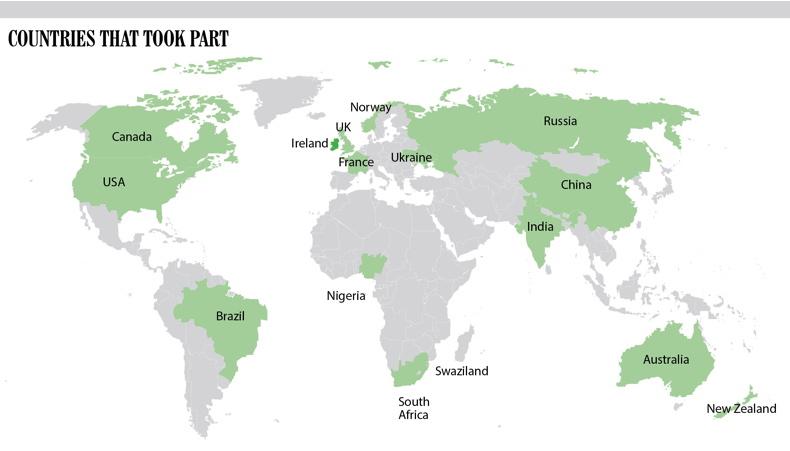
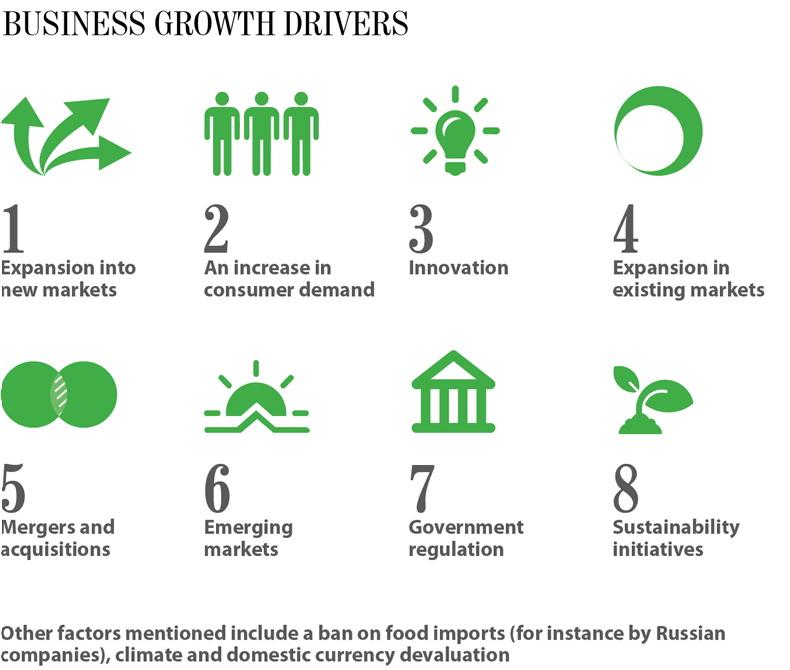
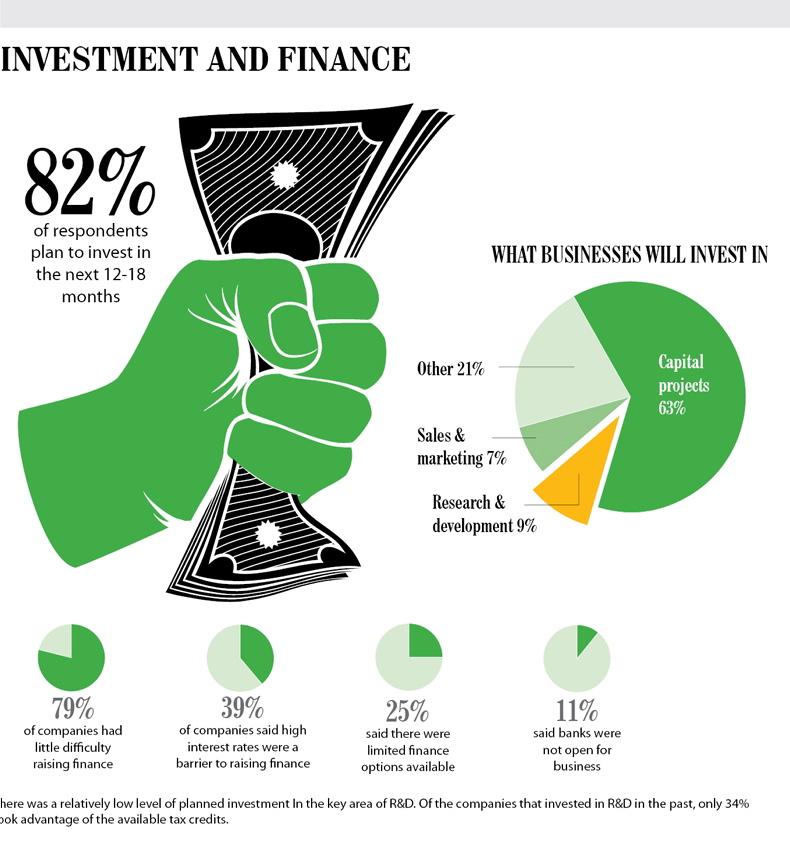
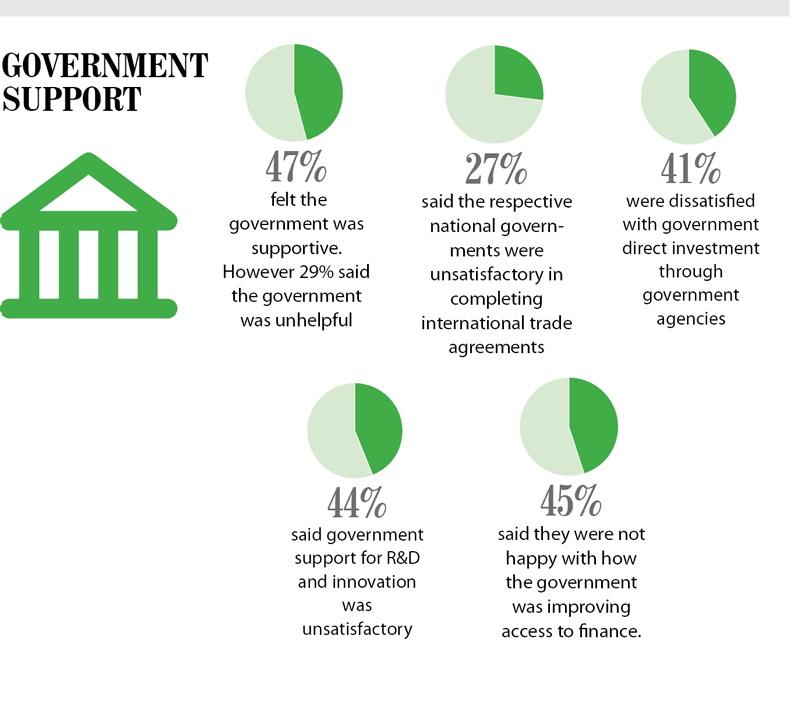

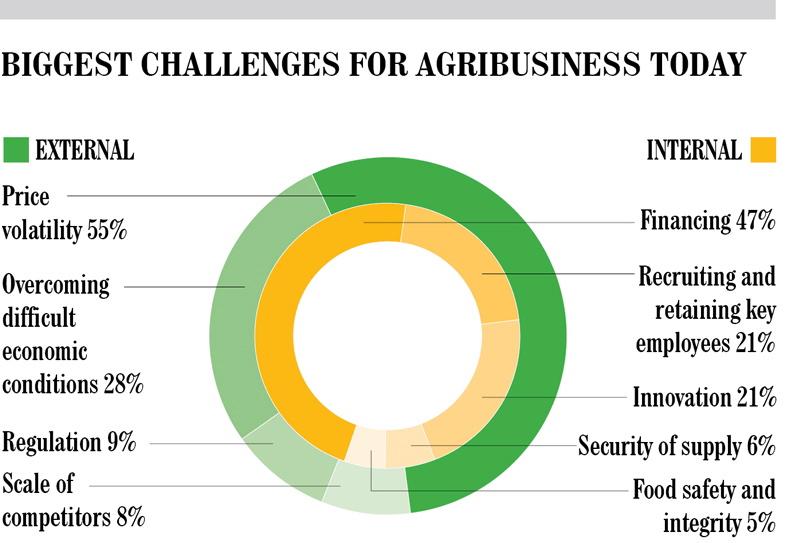

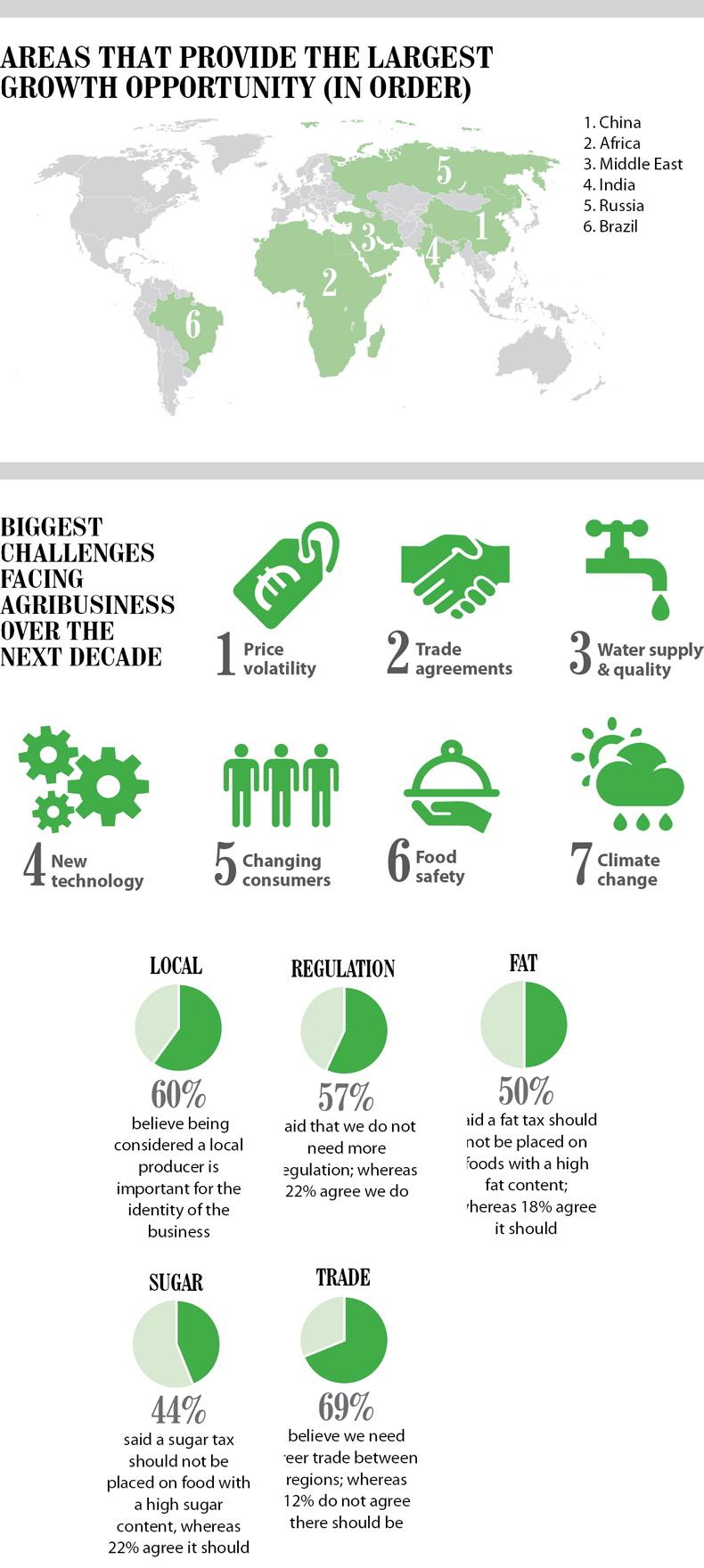






SHARING OPTIONS